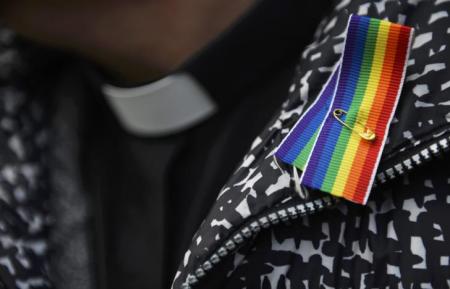Over 2,000 clergy urge Church of England to reconsider transgender affirmation guidance

The Church of England is giving “serious consideration” to an open letter signed by over 2,000 clergy that criticizes the denomination’s recent transgender affirmation guidance.
The letter calls on the Church of England’s House of Bishops to “revise, postpone or withdraw” its controversialpastoral guidance issued last month that allows Anglican clergy to perform Affirmation of Baptismal Faith ceremonies during church services to symbolize a person’s gender transition.
The guidance also encourages clergy to refer to trans-identified people by their chosen name and preferred pronouns.
The letter, which was signed by 2,251 signatories as of Tuesday afternoon, explains that while gender dysphoria has been recognized for decades, “evidence from the medical and social sciences is often conflicting and poor quality.”
The letter stresses that “controversial new theories” regarding the relationship between biological sex and the meaning of gender have been linked to gender dysphoria.
“These ideas continue to be widely contested, with well-intentioned and thoughtful people on all sides of the debate,” the letter states.
“The many ordinary parents and teachers who now express concern about these new theories do not wish to cause harm to the tiny number of children afflicted by gender dysphoria; but neither do they want to harm the potentially larger numbers of children by prematurely imposing untried and untested ideas on young children.”
The letter asserts that the December guidance “raises some significant issues for the Church’s belief and practice.”
Although the proponents of the guidance claim that no new liturgy will be offered, those who oppose contend that it does create a new liturgy “since existing wording is now being put to a new purpose.” Traditionally, the Affirmation of Baptismal Faith is a ceremony for people who have already been baptized but want to re-affirm their commitment to Christ.
The letter also voices concern about what they say could be a “misuse of the liturgy” since the reaffirmation of baptismal vows should be focused on “celebrating new life in Christ” instead of a “new situation or circumstance.”
“We are similarly concerned at the inclusion of new biblical readings within the guidance and their suggestion that the changes of name for biblical characters in the light of God’s salvific action and intervention offer a legitimate parallel to the change of name associated with gender transition,” it reads.
The idea of celebrating gender transition appears to be “based on the rejection” of the difference between male and female, it notes.
“This dimorphism is not only an almost universal biological reality (with the exception of a very small number who are biologically intersex) but has also been the basis of the Church’s understanding of Christian marriage, is seen as an important feature of God’s work as creator, and is a symbol of God’s covenant relationship with humanity. The guidance offers no theological reflection to justify this sort of revised narrative.”
Other concerns expressed include the “rapid onset gender dysphoria (ROGD) particularly amongst girls who appear to lack confidence in their identity as female,” and the negative and permanent effects that puberty blocking hormone therapies can have on gender-confused children as noted by health experts. The letter comes as the United Kingdom’s National Health Service launched an investigation last year as to why the gender clinic referrals have increased 4,000 percent in the last 10 years.
“[T]here is no scientific or medical consensus that surgical and medical interventions (‘gender transition’) effectively address the complex symptoms associated with gender dysphoria over the long term,” the letter stresses. “The bishops’ guidance offers no recognition of the wider issues at play here.”
Although Archbishop of Canterberry Justin Welby had previously said that the guidance is not mandatory, not a “change of doctrine” and that those who oppose the guidance can ignore it, that does not satisfy the concerns of the clergy who signed the opposition letter.
Although the clergy members are grateful for the clarification, they say that the guidance “remains a new policy statement by the House” that is “to be incorporated into Common Worship.” If the guidance stands, the critics fear that it will be seen in the future as “signifying a change in liturgical and therefore doctrinal understanding, whether or not that was intended.”
In a statement to The Sunday Times, the Church of England responded to the letter:
“The bishops will give the letter their serious consideration, especially in the context of the preparation of a major new set of teaching and learning resources on identity, relationships, marriage and sexuality, ‘Living in Love and Faith’ which will be published next year. Transgender matters will be covered in those resources and the pastoral guidance does not pre-empt the work of the ‘Living in Love and Faith’ process. The guidance is not a restatement or a new statement on matters relating to gender, nor does it change the Church of England's teaching.”
The Rev. Ian Paul, a member of the Archbishop’s Council, told The Sunday Times that the backlash to the transgender guidance was “unprecedented.”
“This is the voice of the Anglican core,” he declared.
It didn’t take long after the guidance was released in December for theological conservative members of the denomination to denounce it. One of them is Andrea Williams, the chief executive of the Christian Legal Centre.
In a statement, she called the guidance a sign that the Church of England was continuing its "devastating trajectory toward an outright denial of God and His Word."
As trans-identified individuals are already able to marry in the Church of England, the Church of England’s director of mission and public affairs in October backed the U.K. government’s plan to make it easier for trans-identified people to get legal recognition of their preferred gender.
"Trans people with gender recognition are already able to marry in our churches,” he was quoted as saying. “Being transgender does not prevent someone offering themselves for ordained ministry and we have transgender clergy as well as laity."





















